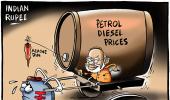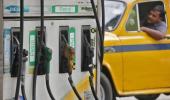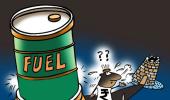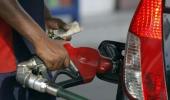'The actual price of petrol is Rs 35 and it jumps to Rs 88 because of government taxes.'

The Congress and other Opposition parties on Monday, September 10, held a massive Bharat Bandh to protest rising fuel prices.
The Congress demanded that petrol and diesel should be brought under the goods and services tax, by which oil prices could drop by about Rs 15 to Rs 18 a litre.
"The government is not bringing petrol and diesel under GST as there will be revenue loss," Madan Sabnavis, chief economist, CARE Ratings, tells Rediff.com's Syed Firdaus Ashraf.
During the UPA's rule, crude oil prices hovered around $140 a barrel. Still, the prices of petrol and diesel in India were never high.
Today, why are the prices of petroleum products so high in India even after crude oil is priced at around $70 a barrel?
The reason why the prices are high is because petrol and diesel are no longer subsidised by the Government of India as it was in the past.
From 2013 onwards, the government has moved progressively towards making the prices of both petrol and diesel 100 percent market oriented.
That is why when the price goes up (in the international market), the exchange rate depreciates automatically and the prices of petrol and diesel go up.
Why were petrol and diesel prices frozen during the Karnataka assembly election? Did the government intervene?
It happened because of government intervention.
It was decided not to increase petrol and diesel prices for those 15 days (prior to the Karnataka assembly election).
The moment the election got over, the prices increased sharply.
Why can't the government intervene now and provide some relief to the common man?
The government can intervene to reduce the prices of petrol and diesel by changing the tax rates.
It can be done at the central level as well as at the state level.
It is VAT (value added tax) at the state level. At the central level there is a fixed rate.
So the government can intervene (to reduce prices).
But the government will have to cut down on tax revenue or alternatively bring back the subsidy.
Will fuel prices come down if petroleum products are brought under GST?
Right now it is not under GST.
The government has not kept diesel and petrol under GST as the tax rates are very high today.
If you look at the tax rate, then the Union excise duty is 100 per cent of the cost.
Your sales tax for various things varies between 60 to 70 per cent depending on the location.
The moment you bring petroleum products under GST, the (tax) rate gets fixed and you (governments) lose the flexibility.
That is the reason why the government is not bringing petrol and diesel under GST as there will be revenue loss.
Isn't the government's objective to serve the people and not ensure that oil companies make huge profits?
Why should the oil companies make losses?
The oil companies buy crude oil at a fixed price.
Then, there is import duty on it by the government which earns a lot of revenue from it.
As petroleum products are relatively inelastic in price, even when the prices move on, the consumption does not go down in a significant manner.
This is a large revenue earner.
I think Rs 5 lakh crore is earned by the Centre and the states on account of the oil bill.
It is huge revenue to forego to bring about any kind of reduction in taxes.
The Rajasthan government reduced the VAT on petrol and diesel by 4 per cent on Sunday, September 9. Why can't other states follow suit?
The states can definitely do it.
Even the Centre can do it.
The Centre is asking the states to do it and the states are waiting for the Centre to do it.
Each state can reduce it (VAT) depending on the exigency that is there.
So (for instance) if an election is happening there, the state government can give incentives to voters by reducing the duty on oil.
There is a 167 per cent tax rate, so the government is getting a lot of revenues.
Somebody have to cut it down in order to bring down prices.
It is because of the 167 per cent tax rate that the price of petrol touches Rs 88 per litre.

In countries like Bhutan and Nepal, which imports refined oil from India, the cost of petrol is much cheaper than in India.
When those countries give benefits to its citizens, why does the Indian government charge us such high taxes?
If the government cuts the duty, it will not be able to spend on other things.
Take Air India. Everybody asks why it is making a loss. No commercial entity can make a loss.
Earlier, IOC (the Indian Oil Corporation), Bharat Petroleum and HPCL (the Hindustan Petroleum Corporation Limited) were making losses.
They are no longer making losses as the costs are transferred to consumers.
If you see the dynamics of our petrol price, Rs 35 is the actual price of petrol -- that is what the cost of production is at Bharat Petroleum and the minimal profit they (the oil companies) are earning.
The actual price of petrol is Rs 35 and it jumps to Rs 88 because of government taxes.
Does it mean that the oil companies will end up like Air India if they do not keep the price of oil high?
If they keep making losses, they will become like Air India.
Right now, they are not making losses.
But in those days, when crude was $140 a barrel and petrol cost Rs 80 per litre, these oil companies were making losses.
It was distribution of loss between ONGC (the Oil and Natural Gas Corporation), the oil marketing companies and government subsidies.
All these three bore the brunt of subsidies provided to consumers.
When Dr Manmohan Singh as prime minister granted subsidies on petrol and did not increase the price of petroleum products, it was called bad economics.
Everybody criticised him then, saying it was a bad decision.
The Modi government is not doing that, so we are saying consumers are paying more.
It is a zero sum game.
If prices go up, somebody has to pay for it.
If consumers do not pay, then government will pay and then the fiscal deficit will go up from 3.3 per cent to 4 per cent.
Then, you will call me and ask what is the government doing about the fiscal deficit.
We keep criticising everything, but at the end of the day if the price of crude oil goes up, if the rupee is getting depreciated, then somebody has to bear the cost.
How does the fiscal deficit affect the common man?
For example, the government is making Rs 5 lakh crore from oil taxes.
Suppose, it reduces the tax by Rs 1 lakh crore and collects only Rs 4 lakh crore, then what happens?
The government will not be able to spend on infrastructure.
When Rs 1 lakh crore is less, then it will have to borrow from the market and that means the fiscal deficit will go up.
So it is balancing fiscal prudence with higher inflation. That is the basic challenge for the government.
As of today, the government thinks inflation is still manageable as CPI (the consumer price index) is around 4 per cent.
Therefore, the government does not think it is a big issue as other prices are down and only petrol prices are high.
Is it a bold decision to raise petrol and diesel prices then?
It is a bold decision, but something has to be done.
Officially, inflation is at 4 per cent and if it goes to 10 per cent, then the government will have to take some action.
Right now, only 1 or 2 items have high prices.
Food prices are low and the manufacturing price is low.
But if you let it go this way, then definitely inflation will start going up.
The RBI (the Reserve Bank of India) will keep increasing interest rates which will affect investment and which will affect growth.
Do you think petrol prices will touch the Rs 100 mark?
It is possible that prices will touch the Rs 100 mark.
The rate at which it is going it is possible.
There are two factors affecting it: One is the crude price per barrel which has gone up to $75 per barrel and secondly, the rupee is depreciating.
If the rupee goes to Rs 74 per dollar, then automatically the cost will go up. Petrol prices can then go up to Rs 100.
Right now, Rs 90 per litre is the rate which I am looking at.











 © 2025
© 2025